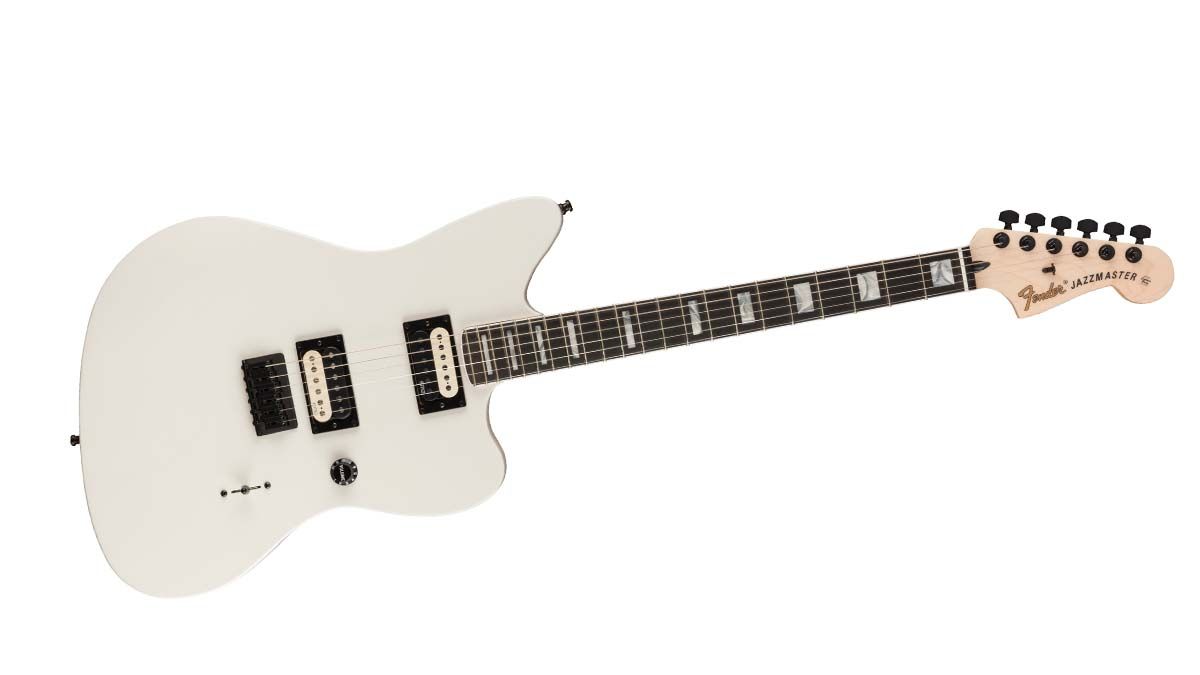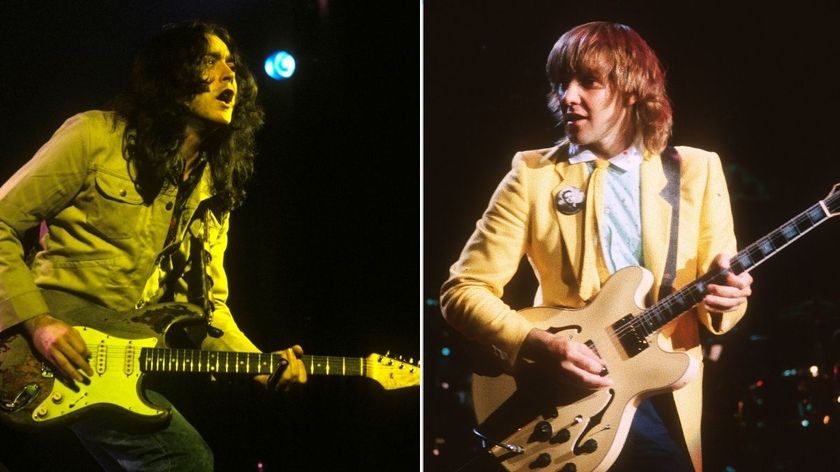GuitarPlayer Verdict
Jim Root's Jazzmaster is stripped down and beefed up. Its signature Daemonum EMG humbuckers are dynamic and powerful, the finish classy. It's built for metal but you could rock it for all kinds of styles – maybe even jazz.
Pros
- +
Great look.
- +
Awesome pickups.
- +
Surprisingly versatile.
Cons
- -
None.
You can trust Guitar Player.
Even though it took me a minute to recognize the genius of Slipknot, I’m a fan of both their music and production values.
Think about it: If you gig in a mask, it not only doesn’t matter how old you are or what you look like, but you can send a substitute to cover for you, and no one will be the wiser.
Seriously though, Slipknot guitarist Jim Root is a tremendous player, and his signature models from Fender are always cool, none more so than the Jazzmaster V4 on review here. I demoed it through a 1x12 Victoria combo as well as with a Kemper Profiler driving a Celestion Greenback-loaded 2x12.
Because my first good guitar was a 1966 Fender Jag, I’ve always had a soft spot for offset body styles. This guitar is pretty much just a Jazzmaster in name and body shape (although the block inlays are a nod to post-1965 models). There really isn’t much else from the Jazzmasters of yore.
You get locking tuners, 22 jumbo frets, EMG humbuckers and a hardtail, string-through-body tailpiece where the whammy system once resided.
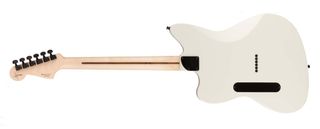
The white body pairs nicely with the ebony fretboard for a classy, updated look, and there are luminescent position markers in the slick white binding so you’ll know where you’re at on a dark stage or in a dark home studio. The no-nonsense control layout consists of a single volume knob and a three-way blade switch.
Acoustically, the JR is a very resonant instrument. I can feel chords all the way through the maple neck and hefty mahogany body.
I dialed up a heavy rock tone and instantly fell in love with the Jim Root Signature Daemonum EMG humbuckers. They’re clear, detailed and not compressed, as well as very sensitive to picking dynamics and volume knob changes.
I’m guessing most players would be using them for high-gain tones, but the fact is they sound great clean as well. Using the Victoria combo, I was able to get cool sparkly sounds by picking softly on arpeggiated chords and awesome Pete Townshend bark on big strums.
Back on a heavily distorted Kemper profile, I found low-string chugs were viciously precise, and I truly dug the creamy sustain I got on the neck pickup.
Root has spoken about his “anti-metal, punk-rock” mentality, which has led him to somewhat unusual choices for the signature models that he plays his über-heavy music on. A plain white Jazzmaster is certainly not the obvious choice for Slipknot-style music, and that’s actually a very cool thing.
If you choose it for playing metal, Root fans will instantly recognize and appreciate it. But if you use it for any other style, it’ll fit right in. The tuxedo-like elegance of it would be at home with a wedding or show band.
You can obviously play surf music on a Jazzmaster, although the lack of a whammy bar makes that a little bit more of a stretch. Any straight-ahead rock would be an absolute breeze with these great-sounding pickups and easy-playing neck, though. This is just a kick-ass guitar in the most unlikely package.
Specifications
- PRICE: $1,399 street
- NUT WIDTH: 1.685”
- NECK: Maple
- FRETBOARD: Ebony, 25.5” scale with 12” radius and luminescent side dots
- FRETS: 22 jumbo
- TUNERS: Deluxe staggered die-cast sealed locking
- BODY: Mahogany
- BRIDGE: 6-saddle string-through body hardtail
- PICKUPS: Two EMG Jim Root Signature Daemonum Open-coil Active Humbuckers
- CONTROLS: Master volume, 3-way blade switch
- FACTORY STRINGS: Fender USA 250L Nickel Plated Steel, .009–.042
- WEIGHT: 9.0 lbs.
- BUILT: Mexico
- CONTACT: Fender
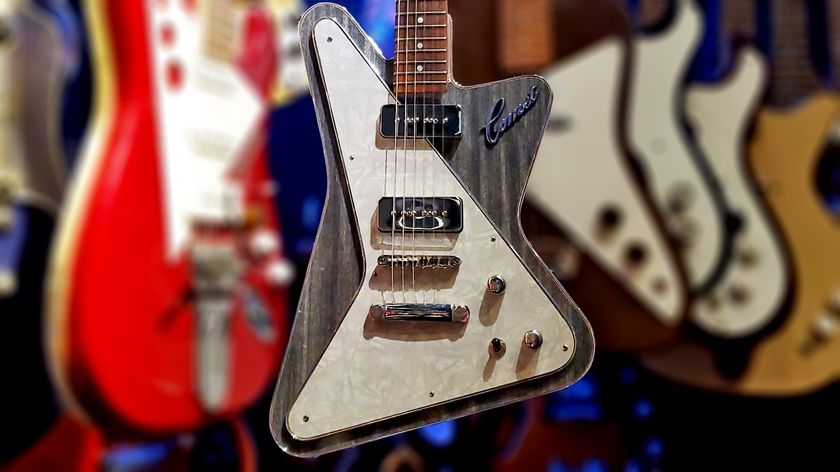
"It's a steal, but since it’s the only one, who knows how it might appreciate?" What do you get when a car designer builds a guitar? Our intrepid guitar hound goes in search of his next six-string oddity
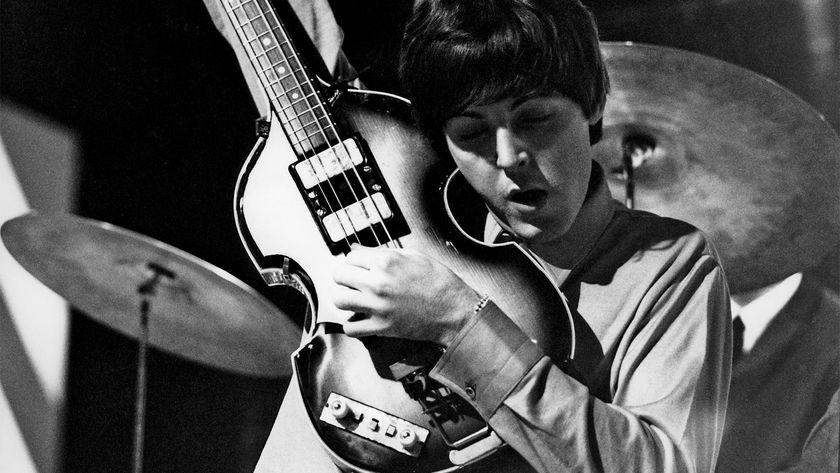
“When I saw this 'Let It Be' footage, I noticed how easy it looked to play.” Paul McCartney on why he pulled his Höfner bass out of mothballs after ignoring it for nearly two decades
Most Popular








